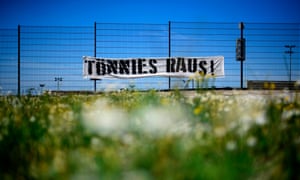
Residents and local businesses in a community in Germany’s most populous state that has been forced back into strict lockdown conditions following a coronavirus outbreak at a local abattoir are angrily demanding that those responsible are held to account.
North Rhine-Westphalia’s Gütersloh district, which has over 360,000 inhabitants, on Wednesday had its first full day under a re-imposed coronavirus lockdown after more than 1,700 employees at the Tönnies abattoir and meat processing plant tested positive.
Schools and kindergartens, bars, fitness studios and museums, which had gradually begun opening their doors again, were forced to close and people are once more limited to meeting up with just one other person outside their household.
Local health authority officials said the drastic measures, to be reviewed on a weekly basis, were the only hope of containing the virus, but it illustrates the anger and fury governments around the world may face if they force released communities back into lockdown.
Meinolf Hartkemper, the owner of a fitness studio which has been forced to close again, told local reporters he was disillusioned, particularly after his business had followed the rules closely. “I am frustrated and angry,” he said. “We followed all the stipulations, whereas this big company appears to have done nothing of the sort.”
Local politicians have tried to ease the tension. At a community meeting at Gütersloh’s town hall on Tuesday evening, the head of the district authority, Sven-Georg Adenauer, called the new regulations “lockdown-light”, since restaurants and cafes were allowed to remain open, albeit under strict conditions.
“I’m confident that we’ll be able to lift them in a week,” he told residents. Business leaders fear the lockdown could last three months.
Around 300 police officers have been sent to Gütersloh to help in the implementation of the lockdown. The neighbouring district of Warendorf, which has a population of 278,000, has also reimposed restrictions due to the outbreak.
Under German government regulations, any community with an infection level exceeding 50 people per 100,000 over the previous seven days must return to lockdown. The abattoir outbreak, affecting a large proportion of the plant’s Romanian and Bulgarian workers, has pushed the Gütersloh rate to more than 200 per 100,000 residents and contributed to pushing the crucial national R rate from below one to close to three.
The incident has also renewed fears of a second wave of the virus, especially at a time when hundreds of thousands of Germans are embarking on foreign holidays to Spain, Greece and Portugal – and triggered a barrage of calls and emails to the region’s travel agents from residents worried about their summer breaks.
Whilst many Güterslohers had until recently lived in the hope of being able to go on holiday – if not necessarily abroad, then at least elsewhere in Germany – many are now being turned away by other states, who say they are not wanted. The Baltic coast island of Usedom has sent home 14 tourists from the district, while Lower Saxony has issued a “lodging ban” on visitors from Gütersloh and Schleswig-Holstein announcing they would have to undergo a two-week quarantine.
Austria has gone further: labelling the entire state of North Rhine-Westphalia a coronavirus hotspot and urging its citizens to stay away. Travellers from the region will not be welcome in Austria, its chancellor, Sebastian Kurz, has said.
Gütersloh is now mass-testing with Tönnies footing the bill, amid calls for its CEO, Clemens Tönnies, to be held to account for an outbreak health inspectors say they believe was triggered by the company failing to abide by physical distancing and hygiene rules in the factory, its canteen and the workers’ accommodation. Tönnies is reported to have initially resisted calls to hand over contact details for its workers, allegedly hampering the track and trace effort. The CEO has admitted mistakes and pledged to change the company.
Fans of Schalke, the Gelsenkirchen football club owned by Tönnies, have vented their fury at the company by hanging protest banners at the club grounds.

Armin Laschet, the head of North Rhine-Westphalia, has called for other regions of Germany not to overreact, insisting the coronavirus tests – now being offered to everyone who wants one – will ensure Güterslohers can prove they are virus free.
He has urged residents only to leave their communities “when it is necessary to do so”, though authorities have admitted they are dependent on people’s good will.
But there is much evidence to show that that is growing thin. Thousands of Gütersloh citizens queued in the sun on Wednesday at the local corona diagnosis centre on for the free tests, which they said they hoped would enable them to travel. Three teams of medical staff are working round the clock to meet demand, testing up to 100 people per hour, according to local media.
“I wanted to go on holiday to Brandenburg,” said Rainer Bart. “We’re supposed to leave in a few days and the kids are literally sitting on their suitcases raring to go. We hope that if we get a negative test result we can present it to our landlords so that they won’t have reason to turn us away just because we come from Gütersloh.”
source https://www.theguardian.com/world/2020/jun/24/west-germany-district-re-enters-lockdown-after-new-covid-19-outbreak



0 تعليقات